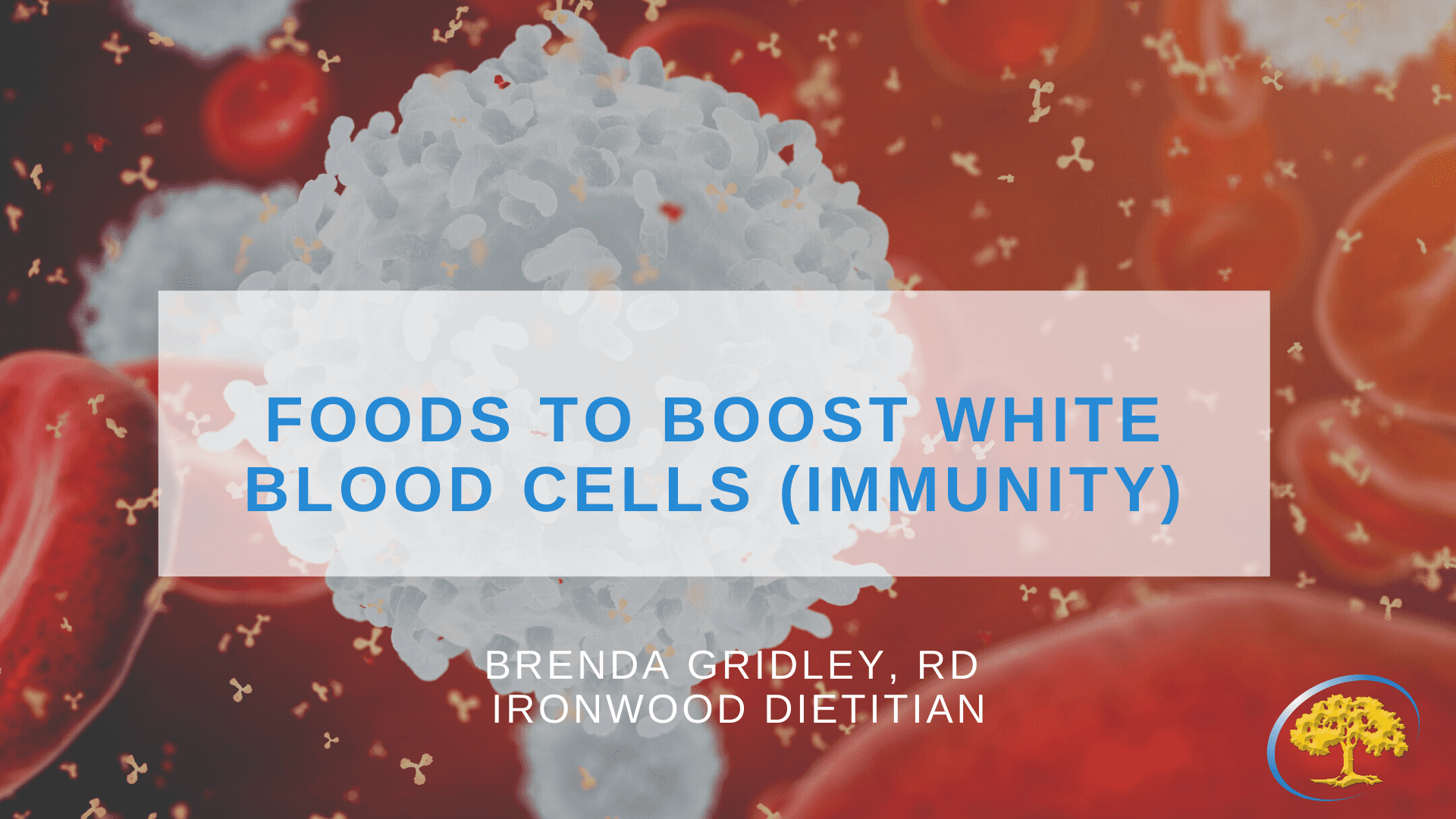
Posted 2 years ago
Foods to Boost White Blood Cells (Immunity)
Low white blood cell counts (WBC’s) or leukopenia, can occur at certain times throughout chemotherapy. Most of the time, blood counts will return to normal before a person starts the next round of chemotherapy, and also after cancer therapy is completed. The body relies on its immune system to fight invaders called antigens, which include bacteria, viruses and allergens. White blood cells attack these harmful organisms, allowing the body to maintain its health. Proper nutrition is key when it comes to maintaining your immune system. Essential vitamins and minerals increase the production and strength of white blood cells, thereby giving your immune system the power it needs to fight infection. Fortify your diet with foods that contain these vitamins but keep in mind that the amount of time it takes for WBC to return to normal varies from person to person.
If your ANC is low, you can minimize your risk of infection by using an antibacterial soap and warm water, and scrubbing your hands for 15-30 seconds several times per day, and every time before you prepare food. If you have neutropenia, you should avoid raw meat, eggs and fish, moldy or expired food, unwashed or moldy fruit and vegetables, and unpasteurized beverages, including fruit and vegetable juice, beer, milk, as well as unpasteurized honey. Fruits and Vegetables should be washed thoroughly before you eat them. It is also very important to practice good hygiene, hand-washing, and food safety practices.
If your diet is poor, or you are having a lot of trouble eating during treatment, you may benefit from taking a multivitamin and mineral supplement with vitamin B12 and folate. The body needs these two vitamins to make white blood cells. However, always talk to your doctor or dietitian before you take any dietary supplements, because some of these products should not be taken with certain chemotherapy treatments.
Omega-3 Fatty Acids
Dietary omega-3 fatty acids can help to increase the production of phagocytes of the body, a type of white blood cells, which engulf harmful invaders. According to a study in 2022 published in Cancer Epidemiology, Biomarkers and Prevention, the levels of white blood cells in volunteers who took dietary fatty acids increased and enhanced the activity of a type of white blood cells called B cells. Foods high in Omega 3 include flaxseed oil, chia seeds, fish oil, walnuts, oysters, salmon, spinach, and soybeans.
Green Tea
Green tea has been used since ages to deal with multiple ailments. It is loaded with antioxidants, which help the body combat infections and is full of flavonoids and epigallocatechin gallate, or EGCG, which enhance immune function and combat infection. Green tea also contains the amino acid L-theanine which increases production of germ-fighting compounds in the T-cells. So enjoy green daily for best results.
Garlic
Garlic is helpful for increasing white blood cells count and boosting natural killer cell activity. Besides, it is rich in the sulfur, which helps to boost the immunity and white blood cell count. A study shows that the antimicrobial properties and high vitamin C content in garlic make it a potent and significant immune-system booster and is very effective against viral, fungal, bacterial, and parasitic infection. It also seems to enhance the ability of WBCs to combat infections and boosts other immune cells. Add garlic to your favorite dishes and salad dressing for flavor enhancement and to reap the many benefits.
Fruits And Vegetables
Fruits and vegetables can help to increase antibody and white blood cell production since they are rich in vitamin C and Vitamin A (Beta Carotene). You need to eat a minimum of 5-6 servings of vegetables and fruits per day to ensure adequate intake of these vitamins. Vegetables containing high amounts of vitamin C consist of peppers of all kinds, mustard greens, brussels sprouts, kale, broccoli, spinach, and cauliflower. Fruits rich in vitamin C include guava, strawberries, papaya, kiwi, citrus, and cantaloupe. Beta-carotene also helps to boost infection-fighting cells & T-cells production and boosts the immune system to increase white blood cells count. Vegetables and fruits high in beta-carotene are carrots, pumpkin, squash, sweet potatoes, apricots, and mangoes.
Special Note: Papaya
This fruit has the ability to increase the production of white blood cells or lymphocytes in the body because it is loaded with vitamin A and Vitamin C. It also contains a digestive enzyme named papain, which has anti-inflammatory effects. Along with that, this fruit is beneficial to improve your overall health because it is a rich source of folate, potassium and B vitamins.
Nuts And Seeds
Foods high in Vitamin E have the ability to make your immunity stronger as they contain antioxidant properties which helps stimulate the killer cells production to help destroy cancer cells and germs. The B-cells production, which comes from the immunity, is also increased by vitamin E which helps to produce antibodies, which is helpful for killing the bacteria. Eat foods such as almonds, peanut butter, sunflower seeds, broccoli and spinach to get your daily vitamin E dose.
Special Note: Brazil nuts
They are a rich source of selenium and in fact, contain more of this mineral than any other nut with an average of 96 mcg per nut. Thus, the average Brazil nut contains 175% of the required amount of this mineral. Selenium is a trace element that is vital for the proper functioning of your body. It is essential for your thyroid and influences your immune system and cell growth. Higher levels of selenium have been linked to enhanced immune function and better outcomes for cancer, infections, infertility, pregnancy, heart disease, and mood disorders. In conclusion, brazil nuts are a highly effective way to maintain or increase your selenium intake. In fact, one study in 60 people found that eating two Brazil nuts per day was as effective as taking a selenium supplement at raising selenium levels.
Vitamins B6, B12 & Folic Acid (Folate)
Folic acid and vitamins B6 and B12 help to produce white blood cells in the body. Foods rich in vitamin B6 consist of sunflower seeds, chicken, turkey, dried nuts, avocados, spinach, and bananas. Foods high in folic acid include lentils; dried beans and peas; leafy greens such as broccoli, spinach, asparagus and okra; and citrus fruits. You can also take folic acid supplements. Foods high in vitamin B12 include low-fat yogurt and milk, fortified breakfast cereals, chicken, clams, trout, and salmon. For recommended doses of these supplements or foods suitable for your health conditions as well as any prescribed medication, remember to consult a doctor.
Lean Protein
Good quality protein is important for cancer patients to include in their diet, because our bodies need the building blocks (amino acids) from the protein we eat to make the new WBCs. Lean meats, such as fish, eggs seafood, and skinless poultry contain high quantities of protein. Great plant based sources include lentils, beans and soy.
Zinc
Zinc is one of the best foods to increase white blood cells you can consume as it can help the body produce more WBCs and makes existing WBCs more aggressive. Foods rich in zinc include turkey meat, beef, crab, and oysters. Plus, you can also find zinc from fortified cereals and beans.
Yogurt
Yogurt is rich in probiotics, which is helpful for fighting against bad bacteria. In addition, it also aids in increasing white blood cells by stimulating your immune system. According to a study, people who consume beverages with probiotics frequently, the WBC are higher because not many bad bacteria that nurture in the digestive tract. In addition, yogurt is also rich in vitamin D, which helps to regulate the immunity and boost the natural defenses of the body against diseases.
About the Author
Brenda Gridley, RD
Areas Brenda has managed include pediatric and neonatal intensive care units where she was responsible for individualizing therapeutic diets and alternate nutrition support based on specific metabolic needs, medical conditions, and cultural preferences.
Her passion for nutrition was developed at a young age and reared by her grandmother who always instilled the importance of a healthy diet and active lifestyle. When her grandmother became ill, Brenda became aware of the impact nutrition plays in disease prevention and maintaining overall mind and body health.
